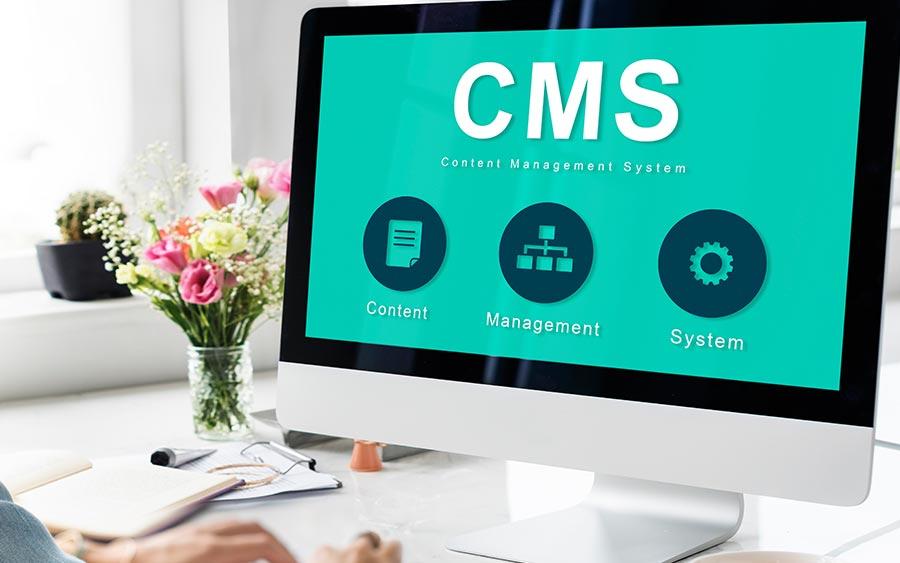Welcome to the digital era, where having a strong online presence is no longer an option, but a necessity for businesses. And at the heart of every successful business website lies a powerful Content Management System (CMS). If you’re wondering what exactly CMS is and how it can help you build an effective business website, then you’ve come to the right place. In this blog post, we will explore the key considerations and best practices for building a stellar business website with CMS. Whether you’re just starting out or looking to revamp your existing site, understanding the ins and outs of CMS will give you a competitive edge in today’s crowded online landscape.
So buckle up and get ready to dive into the world of CMS as we uncover its benefits, discuss essential factors for choosing the right one for your business needs, and reveal expert tips on optimizing your website using this powerful tool. Are you excited? We sure are! Let’s get started!

What is CMS? CMS, short for Content Management System, is a software application that allows you to create, manage, and modify the content on your website without any technical knowledge. It provides an intuitive interface that simplifies the process of adding or updating text, images, videos, and other media elements.
One key consideration when choosing a CMS is its ease of use. Look for a user-friendly interface that allows even non-technical users to navigate and update their websites effortlessly. Additionally, consider the flexibility of customization offered by the CMS. A good CMS should provide ample room for customization based on your unique business requirements.
Another crucial factor to consider is SEO-friendliness. Opting for a CMS that supports search engine optimization can greatly enhance your website’s visibility in search engine rankings. Look out for features such as meta tags management, URL customization options, XML sitemap generation capabilities, and clean code structure for better indexing.
Security should be high on your list of considerations as well. Choose a reputable CMS with robust security measures in place to protect your website from potential vulnerabilities and cyber threats.
Last but importantly, ensure that the chosen CMS offers responsive design capabilities so that your website looks great across all devices – desktops computers, laptops tablets, and smartphones
By keeping these key considerations in mind while selecting a CMS, you will be able to build an effective business website with ease, enjoying seamless content management functionality coupled with enhanced performance
When it comes to building an effective business website with CMS, there are a few best practices that can make a significant difference in the overall success of your online presence.
First and foremost, it is crucial to have a clear understanding of your target audience and their needs. This will help you tailor your website’s content and design to resonate with them, ultimately driving more engagement and conversions.
Next, ensure that your website is visually appealing and user-friendly. A cluttered or confusing layout can quickly turn visitors away. Opt for clean and modern designs that are easy to navigate, with clear calls-to-action guiding users towards desired actions.
Content is king when it comes to SEO optimization, so focus on creating high-quality, relevant content that provides value to your audience. Regularly update your site with fresh content such as blog posts or articles related to your industry or niche.
Another important aspect of building an effective business website is optimizing it for mobile devices. With more people accessing the internet through smartphones and tablets than ever before, having a responsive design is essential for providing optimal user experience across all devices.
Don’t forget about search engine optimization (SEO). Implementing proper meta tags, keyword optimization techniques, and internal linking strategies can greatly improve your website’s visibility in search engine results pages.
By following these best practices during the development process of your business website using CMS technology like WordPress or Drupal – you’ll be well on your way towards creating an engaging online presence that drives traffic leads conversion
Building an effective business website is crucial for any company looking to establish a strong online presence. One of the key considerations when developing a business website is choosing the right content management system (CMS). A CMS allows you to easily manage and update your website’s content without needing extensive technical knowledge.
There are several benefits of using a CMS for your business website. First and foremost, it provides you with complete control over your website’s content. With a user-friendly interface, you can effortlessly create, edit, and publish new pages or blog posts as needed.
Another advantage of using CMS is its flexibility. Whether you need to add new features or change the design of your website, a CMS makes it easy to customize and adapt according to your evolving business needs.
Additionally, using a CMS often results in improved search engine optimization (SEO) capabilities. Many CMS platforms offer built-in SEO tools that allow you to optimize each page’s meta tags, URLs, headings, and keywords – helping boost your website’s visibility in search engine rankings.
Furthermore, having centralized access controls ensures that only authorized personnel can make changes to the website. This helps maintain consistency in branding and messaging while preventing unauthorized modifications that could potentially harm your online reputation.
Using a CMS can save you both time and money in the long run. With its intuitive interface and pre-built templates available for use, creating professional-looking web pages becomes significantly faster than starting from scratch.
In conclusion, utilizing a CMS for building your business website offers numerous benefits such as easy content management, flexibility in customization, enhanced SEO capabilities, centralized access controls, and cost savings. By considering these advantages when selecting the right CMS for your business needs, you’ll be well on your way toward creating an effective and impactful online presence to help drive success for your venture.
When it comes to building an effective business website, choosing the right CMS (Content Management System) is crucial. With so many options available in the market, it can be overwhelming to make a decision. But fear not! I’m here to help you navigate through the process and find the perfect CMS for your business website.
Consider your specific needs and requirements. Think about what functionalities and features are essential for your website. Do you need e-commerce capabilities? Is blogging important for your content strategy? Understanding these requirements will narrow down your choices.
Next, assess the scalability of different CMS options. Your business may grow in the future, so it’s important to choose a CMS that can accommodate that growth without major limitations or disruptions.
Consider ease of use as well. You want a CMS that is user-friendly and intuitive, allowing you and your team to easily update content without technical expertise or constant assistance.
Security should also be at the top of your priority list when selecting a CMS. Look for one with robust security measures in place to protect sensitive customer data and safeguard against cyber threats.
Additionally, consider compatibility with other tools and systems you currently use or plan on integrating into your business operations. A seamless integration between various platforms can streamline processes and enhance efficiency.
Take pricing into account but don’t base your decision solely on cost. Evaluate whether the features provided by a particular CMS justify its price tag based on value delivered rather than just seeking out cheaper alternatives.
Remember, choosing the right CMS requires careful consideration of factors such as functionality, scalability, user-friendliness, security, compatibility, and pricing. Taking all these factors into account will help ensure that you select a CMS that aligns perfectly with your business goals and helps create an effective website that drives results. So dive into research mode today!
You’ll soon find yourself equipped with all the necessary insights to choose wisely the best cms for your business website.
Building an effective business website with a content management system (CMS) is essential for success in today’s digital landscape. It not only allows you to easily create and manage your website but also provides numerous benefits that can help drive growth and achieve your business goals.
When considering CMS options, it’s crucial to evaluate key factors such as user-friendliness, flexibility, scalability, security features, and support. By choosing the right CMS that aligns with your specific needs and objectives, you can streamline website development and maintenance processes while ensuring a seamless user experience.
Implementing best practices throughout the design and development stages is vital for creating a compelling business website with CMS. Focus on optimizing site speed, mobile responsiveness, navigation structure, SEO-friendly URLs, relevant content creation strategies, and intuitive interface design elements like menus and calls-to-action buttons – all of these aspects contribute to enhancing user engagement and boosting conversion rates.
Using a CMS for your business website offers several advantages. It empowers non-technical users to manage content updates independently without relying on IT assistance constantly. This saves time and resources while enabling quick response times when it comes to publishing new information or making changes on your site.
Additionally, CMS platforms often have built-in SEO capabilities that allow you to optimize your web pages efficiently. With easy access to meta tags, keyword optimization tools, and XML sitemaps generation features, you can boost search engine visibility, promote organic traffic, and improve overall rankings in SERPs.
In conclusion,/Overall/, building an effective business website using a content management system is crucial for success in the competitive online marketplace.
With its ease of use, supportive community, and robust feature set, CMS makes it possible for businesses of all sizes, to create visually stunning, user-friendly websites that cater, to their target audience’s needs.
Choosing the right CMS platform tailored specifically, to your requirements will allow you, to leverage its full potential, in growing brand awareness, capturing leads, and driving conversions.
Start your website with CMS now, and watch your business soar to new heights! For free consultation call 1-916-358-6449

Why Hiring an SEO Professional in Roseville CA Can Transform Your Business

How to Find the Best WordPress Expert in Roseville for Your Website

How Local SEO Services in Sacramento Can Boost Your Business’s Online Presence

Why You Need the Best Web Designers in Sacramento for Your Business

Enhance Your Online Presence with Custom Web Design in Roseville CA

Top Strategies in Digital Marketing for Chiropractors

5 Reasons Why You Should Hire a Roseville WordPress Web Designer for Your Business Website